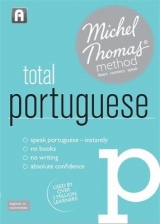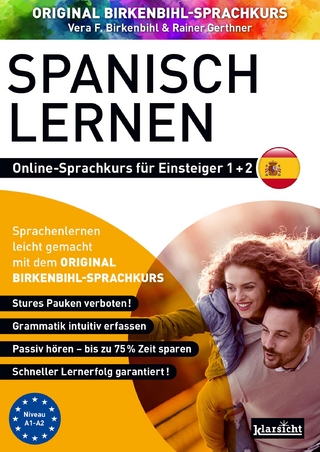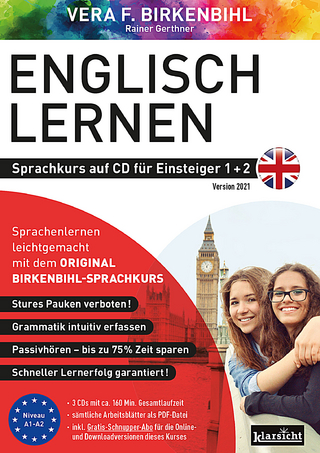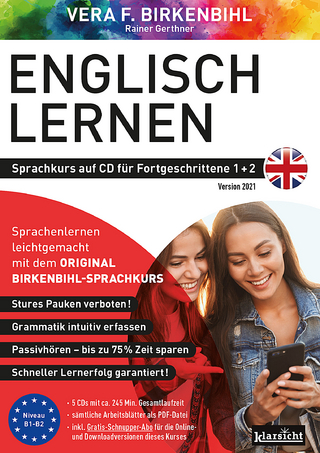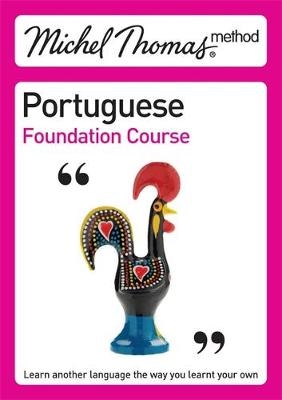
Michel Thomas Method
John Murray Learning (Verlag)
978-0-340-97167-3 (ISBN)
- Titel ist leider vergriffen;
keine Neuauflage - Artikel merken
An eight-hour, 100% audio method for learning Portuguese. Join Michel Thomas's editor Virginia Catmur, native speaker Paulo Santos and two students in a live lesson and within the first hour you will be able to construct simple phrases. You will learn the language with the students, hearing both their successes and their mistakes to keep you motivated and involved throughout the course. By the end, you will have the confidence to understand and speak Portuguese. On the final track, the teachers are joined by native Brazilian Portuguese speaker Gui Tavares to give you an insight into Brazilian pronunciation and usage.
Join the millions of people worldwide who have learnt a new language with the Michel Thomas Method.
Contents: 8 CDs plus booklet with Portuguese phrases in English translation.
Virginia Catmur studied Portuguese at the universities of Oxford and Lisbon. As Languages Editor at Hodder, she worked in the studio with Michel Thomas during the recording of his Advanced courses in 2004 and was responsible for their audio editing. She has since developed courses in new languages using the Michel Thomas Method.
-ible / -able cognates (nao) e para mim / para o senhor/a senhora ('it's (not) for me / for you' - negatives & prepositions) lamento ('I'm sorry' - 'I' verb ending) -ant / -ent cognates porque e que...? ('why is it that?' - asking questions) / tenho( o), quero(-o) ('I have it, I want it') nao o tenho/quero ('I don't have/want it' - reinforce 'I' verb ending & position of 'it') o que...? ('what...?' - asking questions) tem / quer /quere-o ('you have/want it' - 'you' [formal] verb ending) / posso ('I can') / pode ('you can') fazer / comer / ver / saber ('to do/eat/see/know' - introduction to verb infinitive) 'to be hungry' idiom ary cognates position of 'it' etc. with verb infinitives precisar de ('to need OF' - verb + 'of' & contraction of 'of' and 'it') nao o quero ver/quero ve-lo ('I don't want to see it/I want to see it' - position of 'it' & infinitive -ence / -ance cognates a / uma ('the/a') esta ('this') jantar 'to dine') -tion cognates onde? ('where') pode ('will you/can you?' + dar ('to give') converting '-tion' nouns into verbs introduction to the 3 types of verb infinitive (-AR / -ER / -IR) sair ('to go out') / vir ('to come') / compreender ('to understand') / dizer ('to say') / comprar ('to buy') / ver ('to see') / ter ('to have') with o, a, os, as, me ('it, them, me') tenho & tenho de ('I have' & 'I have to') quando? ('when') / -ic cognates the position and agreement of adjectives em Portugal / no Brasil ('in Portugal/in [the] Brazil') como? / quanto? ('how' / 'how much') estar (estou & esta) vs. ser (sou & e) ('to be/I am/you are/she/he/is' - two verbs for 'to be') ir + infinitive ('to be going to' - introduction to immediate future) mais ('more') how to ask 'at what time?' use of ele / ela / o senhor /a senhora ('he/she/you') to clarify or emphasise reinforce adjective agreement and use of two forms of 'to be' tudo & nada ('everything/nothing') muito ('much/very') Portuguese verb infinitives: -AR / -ER / -IR com ele, com ela, com o senhor, comigo ('with him / her / you') / present tense ('I / she / he / you' formal) encontrar / falar / vender / compreender ('to find/speak/sell/understand') how to express in Portuguese 'am -ing', 'is -ing', 'are -ing' and 'do' / 'does' / 'don't' / 'doesn't' escrever / saber / fazer / sair/ gostar de / dizer / preparer ('to write/know/do/go out/like/say/prepare') 'what' (middle) = o que 'want' + 'say' = 'mean' two tracks: AR track /not -AR track / present tense ('they' and 'you all') / vowel sounds present tense: irregular forms for 'I': dou / estou / sou / vou / sei ('I give/am/go/know') present tense: 'you' (informal) commands: switching tracks 'this' as adjective and pronoun position of pronoun with negative command / position of pronoun with positive command ir / chegar ('to go/arrive') present tense: 'we' form 'nho' verbs (faco, venho 'I do/make' etc.) verbs the imperative: 'nho' verbs become 'nha'; 'zer/co-go' verbs (dizer, fazer, trazer - 'to say/do/bring') become 'ca-ga' reflexive verbs: levantar-se ('to lift oneself up = to get up') ha ('there is/are') demasiado ('too/too much') vemo-nos ('we'll see each other' = 'meet up') future tense: * with present * with 'going to' * with 'will' endings the future tense ('I will buy') the conditional tense ('I would buy') future tense with pronouns gostaria de ('I would like') the past tense ('I bought/have bought' etc.) ficar / comecar ('to be situated, remain, stay / to begin') progressive tenses ('to be making'): estar a + infinitive making suggestions esperar ('to wait'); perguntar ('to ask') in order to (para) to have just ... (acabar de ...) ago (ha)
| Erscheint lt. Verlag | 1.10.2008 |
|---|---|
| Reihe/Serie | Michel Thomas Method |
| Sprache | englisch |
| Maße | 139 x 198 mm |
| Gewicht | 563 g |
| Themenwelt | Schulbuch / Wörterbuch ► Erwachsenenbildung |
| Schulbuch / Wörterbuch ► Wörterbuch / Fremdsprachen | |
| Geisteswissenschaften ► Sprach- / Literaturwissenschaft ► Sprachwissenschaft | |
| ISBN-10 | 0-340-97167-3 / 0340971673 |
| ISBN-13 | 978-0-340-97167-3 / 9780340971673 |
| Zustand | Neuware |
| Haben Sie eine Frage zum Produkt? |
aus dem Bereich
